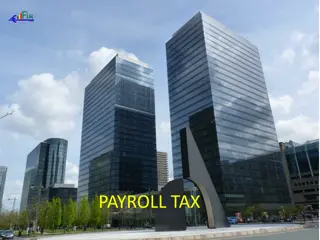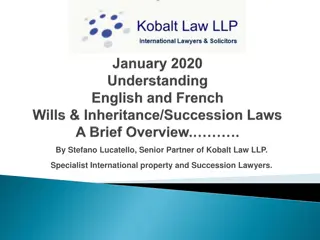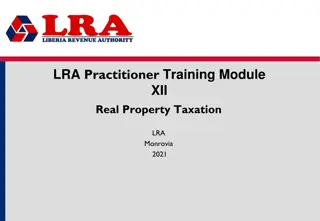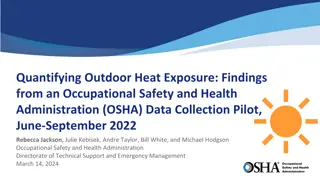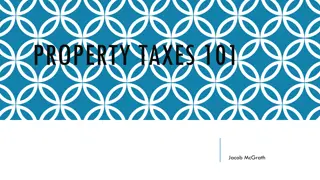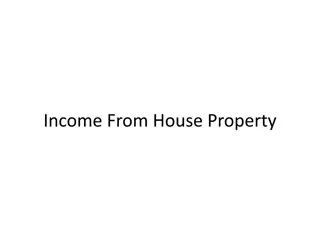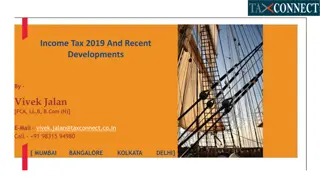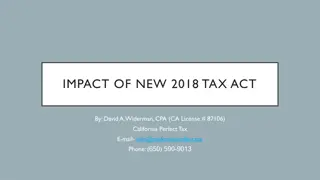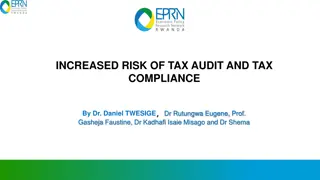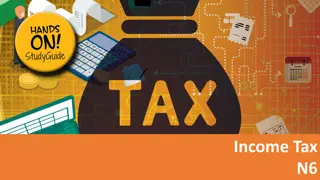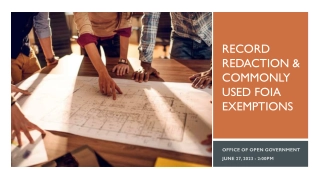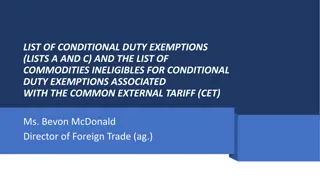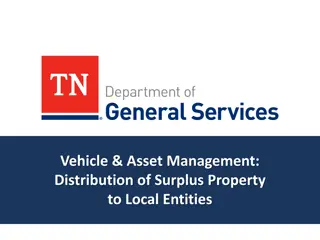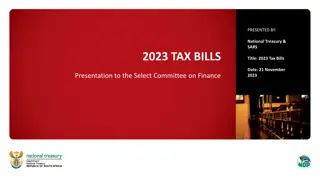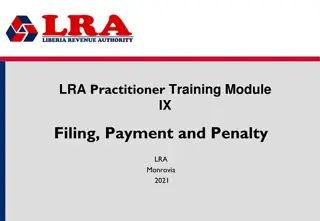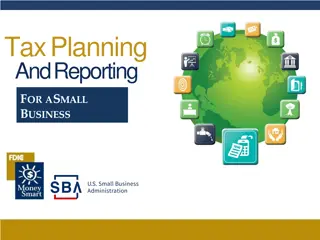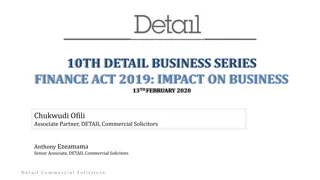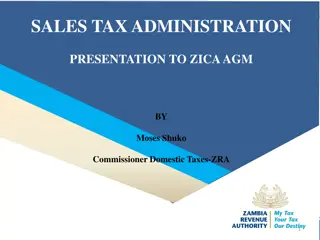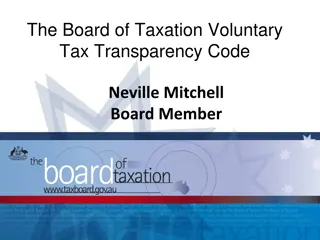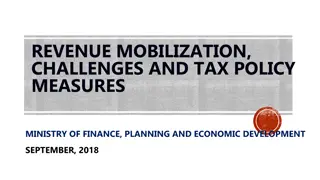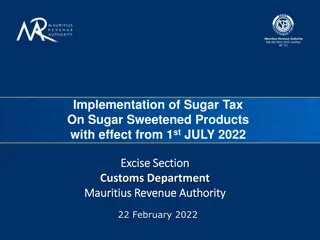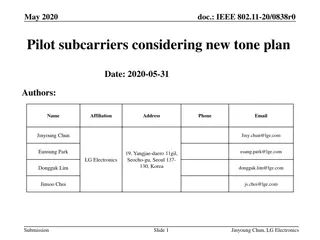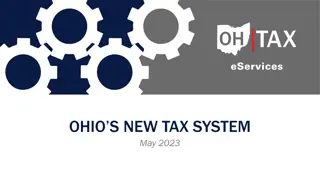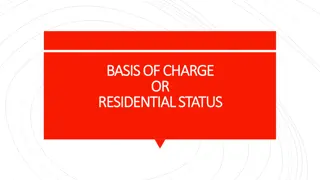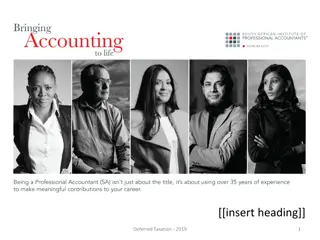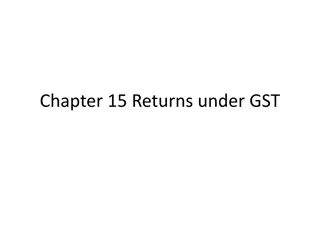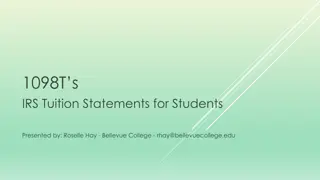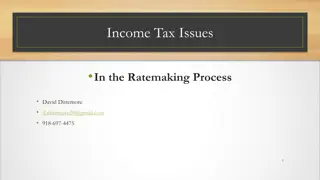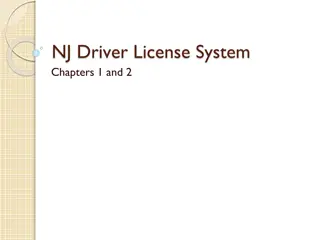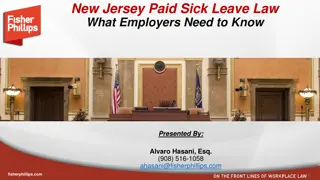Understanding PILOT Programs for Property Tax Exemptions in New Jersey
Explore the world of PILOT programs in New Jersey, including the types, benefits, and purposes. From providing affordable housing to spurring redevelopment, learn how PILOT initiatives can transform communities and incentivize property improvements without the burden of high taxes.
Download Presentation

Please find below an Image/Link to download the presentation.
The content on the website is provided AS IS for your information and personal use only. It may not be sold, licensed, or shared on other websites without obtaining consent from the author. Download presentation by click this link. If you encounter any issues during the download, it is possible that the publisher has removed the file from their server.
E N D
Presentation Transcript
PILOTS IN PRACTICE PILOTS IN PRACTICE ROUND TABLE ROUND TABLE TCTA NJ Annual Conference Paul Lesniak, CTC/CMFO, City of Elizabeth Susan Jacobucci, Administrator CMFO Paulsboro May 18, 2022
DISCLAIMER DISCLAIMER None of the Information presented is meant as legal advice Any sarcastic comments or opinions are those of the panelists and do not reflect official positions of their respective employment or the TCTA. Feel free to open any discussions or ask any questions you are now in the cone of silence.
take me to the PILOT take me to the PILOT What is a PILOT Payment In Lieu Of Taxes N.J.S.A. 40A:20-12(b) But wait, there s more HMFA 6.28% sheltered rents Long Term Tax Exemption Law : Redevelopment Projects. UEZ Short term Tax Exemptions: rehabilitation
WHAT TYPE? WHAT TYPE? Most Common: Municipality (95%; County 5%; Schools Zilch)***(to keep peace, sometimes schools included) During the Term in lieu of any taxes to be paid on buildings and improvements and to the extent authorized on land, the URE shall make payment to the municipality of an annual service charge, which shall remit a portion of the revenue to the county In addition, the municipality may assess an administrative fee not to exceed 2% of annual service charge. N.J.S.A. 40A:20-12(b).
WHAT TYPE? WHAT TYPE? NJHMFA usually used to support affordable housing; often associated with Low Income Housing Tax Credits Income restricted/qualified 6.28 % of GROSS sheltered rents May have certain requirements as to unit size; 1-2-3 bedrooms; common areas and amenities.
WHAT TYPE? WHAT TYPE? Long Term Tax Exemptions (LTTE) Redevelopment Projects Annual Gross Revenue OR Total Project Costs Annual Gross Revenue floor
WHY A PILOT? WHY A PILOT? To make undevelopable areas developable To lure new ratables/homeowners (ex Philadelphia) To provide affordable housing including senior housing To spur redevelopment or repurposing To encourage needed property improvements without the burden of higher taxes
BENEFITS OF PILOTS BENEFITS OF PILOTS PILOTS are a useful tool to attract investment In non-residential projects the positive impact on employment Additional community benefits/involvement Project competition Leverage of revenue to help a municipality Provide tax certainty for the developer
TODAY: LTTE PILOTS TODAY: LTTE PILOTS Limited to Urban Renewal Entities URE Subject to a profit limitation of 12% (below a market investor s rate of return) LTTE PILOTS basis of Annual Gross Revenue AGR (10% of AGR floor) or Total Project Costs TPC (2% of TPC floor) [floor= minimum payment]
LTTE PILOTS LTTE PILOTS Annual separate audits must be completed TPC must be independently certified by an architect or engineer Generally limited to 30 years Requires Statutory Phase in to full taxes with final stage being 80% of traditional taxes
METHODOLOGY METHODOLOGY Pre Tax Collector Involvement Why? What Type Does area qualify does developer qualify? Financials Agreement
IT TAKES A VILLAGE IT TAKES A VILLAGE TC must work in conjunction with Planning Officials; Legal; Finance; etc. It s a team effort TC should be included from Day One, when the idea starts not just as a Collector of the PILOT
PILOT NJSA 40A:20-12(b) Payment In Lieu Of Taxes - N.J.S.A. 40A:20-12(b). During the Term in lieu of any taxes to be paid on buildings and improvements and to the extent authorized on land, the URE shall make payment to the municipality of an annual service charge, which shall remit a portion of the revenue to the county In addition, the municipality may assess an administrative fee not to exceed 2% of annual service charge.
PRESENT REALITY vs PILOT PRESENT REALITY vs PILOT Taxes PILOT Municipality County Schools County Municipality
Example Any Project Urban Renewal, LLC Municipal Revenue Comparison Conventional Property Taxes And Tax Abatement Program
PILOT METHODOLOGY LTTE PILOT METHODOLOGY LTTE Application made to Mayor or CEO Application must be from an URE Urban Renewal Entity Must have property description (formal metes and bounds) Must include a statement of the Project use, units, size, property etc. Must include a fiscal plan for the entire proposed lengthof the PILOT (30 years max)
APPLICATION CONTINUED APPLICATION CONTINUED Must include phasing of Project, if applicable Redevelopment plan and redevelopment agreement must be described Include any other benefits for the municipality job creation, recreation opportunities attached, disabled or veteran accessibility etc Municipality/Mayor has 60 days to act.
A PILOT IS AN AGREEMENT PROVIDING AN EXEMPTION Exemption allowed when clerk certifies to tax assessor that a financial agreement has been entered by the municipality. Deliver to tax assessor certified ordinance and financial agreement. It means building, improvements, and sometimes land are listed on municipal tax roles as exempt from taxation for the period in the tax exemption. N.J.S.A. 40A:20-12 PILOT payment is made to the municipality and it is not shared by the municipality with the county and board of education in the same way that traditional ad valorem taxes are shared.
AGREEMENT AGREEMENT Includes annual audit make sure funds not left on the table/uncollected May include staging PILOT payable is the greater of the ASC or the percent of the taxes otherwise due; Timing of payments (yearly; on same due date as taxes; semiannually?) PILOT calculation To send or not to send billings -
METHODOLOGY A Financial Agreement must be approved by ordinance of the municipality The municipalities determination as to (N.J.S.A. 40A:20- 11): (a) relative benefits to the project or redevelopment area when compared to costs (b) statement of importance of granting to obtain development & impact locational decisions of probable occupancy.
TERM TERM What can the term of a PILOT be? N.J.S.A. 40A:20- 12(a) A financial agreement may specify duration of up to 30 years from completion but not more than 35 years from signing of a financial agreement. NOTE: The term of the exemption can be less than 30 years. 10 yrs, 15 yrs , or 20 yrs - depending upon the municipality and the market.
LAND TAXES? Land taxes exempt for housing projects. N.J.S.A. 40A:20-12. Land taxes cannot be exempt for retail, commercial, office, industrial. If the land taxes are not exempt then the entity must pay them as billed by the municipality. However, once paid by the entity the land taxes are credited against the entity s annual service charge payment. N.J.S.A. 40A:20-12(b)(2). NOTE: If the land taxes are not exempt under the tax exemption, they remain traditional ad valorem taxes. Thus, they continue to be shared by the municipality with the county, board of education, and etc..
ANNUAL SERVICE CHARGE (ASC) N.J.S.A. 40A:20-12(b)(1) A percentage of annual gross revenue (AGR) generated by the Project. Not less than 10% of AGR for market rate projects. Not more than 15% of AGR for low or moderate income housing OR, at the option of the municipality, Not less than 2% of the Total Project Cost for market rate projects. Not more than 2% for low or moderate income housing NOTE: 2% of TPC formula usually reserved for office retail industrial, possibly for sale affordable housing. NOTE: a tax exemption can have a schedule where the ASC increases over the term of the exemption. NOTE: a tax exemption can have different ASC for different types of uses (i.e. projects that have market rate and affordable housing units).
ANNUAL GROSS REVENUE AGR Annual gross rent and other income of the entity. N.J.S.A. 4A:20-3(a). Includes rent, insurance, operating and maintenance expenses paid for by a tenant which are ordinarily paid for by a landlord. N.J.S.A. 4A:20-3(a). NOTE: It includes apartment rent, retail or commercial space rent, parking space rent, revenue from washer/dryer etc. NOTE: It does not include certain subsidies from government for certain types of affordable housing projects. NOTE: It does not include any gain on the sale of a condo unit. When an entity and municipality limit gross revenue in the financial agreement they do so at the risk of violating the statute.
What is annual gross revenue in a for sale Project? N.J.S.A. 40A:20-14(a) Components: Note: upon a sale of a condominium unit at a higher price municipality may increase the annual service charge using the new deed price. Deed Price Common Expense Assessment on Unit Impute Interest Rate Presume 100% financing for term of tax exemption Note: if the unit decreases in value, the service charge will never go below the initial assessed value for the unit. Note: if certain condominium units in the project are not sold, a tax assessor shall establish the service charge by determining the initial assessed value for the unit. Note: For residential condominium units, the governing body may, by resolution, suspend or increase the annual service charge on the unit if the unit owner moved out and leases the unit to a tenant. NJSA 40A : 20-14
What is Total Project Cost? Estimated Total Project Cost Calculation per N.J.S.A. 40A:20-3(h) A. Cost of land and improvements to Urban Renewal Entity B. Architects, Engineers, surveying and Attorney Fees (paid or payable) in connection with the planning, construction and financing of the Project $30,240,000 $5,876,497 $114,471,134 C. Projected construction cost per architect s estimate D. Insurance, Interest, and Finance Costs during Construction $16,188,882 E. Cost of Obtaining Initial Permanent Financing $2,501,000 F. Marketing and other expenses payable in connection with initial lease of units $250,000 G. Real Estate Taxes and Assessments during Construction Period $249,350 $5,723,557 H. Developer s Overhead based on a percentage of (c) above, to be computed in accordance with percentage given in law N.J.S.A. 40A:20-3 (h) Total Project Cost $175,500,420 NOTE: N.J.S.A. 40A:20-8(c) requires a statement prepared by a qualfied architect or engineer of the estimated cost of the proposed project . This is presumed to mean the construction cost - see C. above
Projected construction cost per architects estimate EXHIBIT C-1 WAVE URBAN RENEWAL LLC Certification of Estimated Construction Costs On this _______day of November, 2018, the undersigned being the architect for the Project, does hereby certify to the best of my knowledge and based upon estimates provided by Wave Urban Renewal LLC, that Item C of Exhibit C accurately reflects the estimated construction costs of the Project. By: __________________ Architecture and Engineering, LLC Name: _____________________, AIA
What are mandatory staged adjustments? N.J.S.A. 40A:20-12(b)(2) 1st Stage: = ASC for a time not less than 6 years, not more than 15 years NOTE: This stage allows for project stabilization. 2nd Stage: Greater of ASC or 20% of what conventional taxes on land and improvements would otherwise be for a time period not less than 1 year, and not more than 6 years. 3rd Stage: 40% 4th Stage: 60% 5th Stage: 80% NOTE: This stage allows for the project to gradually pay charges that are comparable to conventional ad valorem taxes. NOTE: a financial agreement must have all 5 stages. NOTE: Conventional tax assessment principles collide with ASC principles. Tax Assessor and URE should cooperate during the term of the tax exemption to make sure that the tax assessment on the books (land and improvement) is accurate to avoid disputes on the ASC when staged adjustments go into effect. NOTE: The entity is still paying a PILOT payment, not conventional taxes!
Annual service charges What is a minimum annual service charge (MASC)? The total taxes levied against the property in the last full year in which the property subject to taxation. The entity pays the MASC in any year that the MASC is higher than ASC. N.J.S.A. 40A:20-12(b)(2). What can the term of a PILOT be? N.J.S.A. 40A:20-12(a) A financial agreement may specify duration of up to 30 years from completion but not more than 35 years from signing of a financial agreement. NOTE: The term of the exemption can be less than 30 years. 10 yrs, 15 yrs , or 20 yrs - depending upon the municipality and the market. How is a PILOT memorialized? A financial agreement is entered into between the municipality and a developer. N.J.S.A. 40A:20-9.
When does a project qualify for a long term tax exemption? N.J.S.A. 40A: 20-4 1. A project is in a redevelopment plan that has been adopted under theLocal Redevelopment and Housing Law. (N.J.S.A. 40A:12-1 et seq.) . 2. A project is necessary, useful, or convenient for the relocation of residents to be displaced by redevelopment in a redevelopment plan. 3. A low income housing project even if it is not in a redevelopment plan. 4. A moderate-income housing project even if it is not in a redevelopment plan. 5. A project is in an Urban Enterprise Zone where such zone has been designated as such under the New Jersey Urban Enterprise Zone Act (N.J.S.A. 52:27H-60).See Local Redevelopment and Housing Law (N.J.S.A. 40A:12-5(g)).
How does a Company qualify for a long term tax exemption? N.J.S.A. 40A:20-5 State Urban Renewal in name. Purpose stated: operate under LTTEL. No business other than the Project. Purpose Stated: operations directed toward redevelopment and associated activities; low-moderate income housing. Limitation on transfer of project. Make ownership disclosures. Limitation on profits. crisis management by municipality and NJ Dept. of Com. Affairs. NOTE: Corp., LLC, LP and Partnership OK - Unincorporated entity; however, it must file a trade name certificate with the County Clerk s office. NOTE: An out of State entity may qualify to be an urban renewal entity in New Jersey.
How does a company qualify as an urban renewal entity? 1. File original the company organizational certificates and an original Dept. of Community Affairs disclosure certificates withDept. of Community Affairs in Trenton. 2. Company organizational certificate must have all of the language in it that is required by NJSA 40A:20-5(a) thru (g). Language must be recited word for word. 3. If approved, DCA issues a Certificate of Approval and returns original company organizational certificates to the applicant. 4. Applicant must file the company organization certificate with the Certificate of Approval with the Secretary of State. If the entity is to be an unincorporated entity it must file a trade name certificate with the Certificate of Approval in the County Clerk s office. NOTE: The NJ Secretary of State will reject the filing if the Certificate of Approval is not attached.
What powers does an urban renewal entity have? Same powers as any other duly formed corporation, partnership, limited liability company, etc. N.J.S.A. 40A:20-6 and 7. When must a qualified urban renewal entity apply to a municipality for a long term tax exemption for a project? Before proceeding with any projects (N.J.S.A. 40A:20-8). What does beforeproceeding mean Before commencement of work on a Project.
What must a qualified urban renewal entity do to apply for a long term tax exemption? N.J.S.A. 40A:20-4: acquire by purchase or lease for not less that the term It must: own the land or land and improvements; be lessee of land and /or improvements with a lease term that is longer than the tax exemption applied for;
What must be in the entitys tax exemption application? See N.J.S.A. 40A:20-8(a) through (f) as follows: (a) A general statement of the nature of the project. (b) A description of the project area, description of units in the project. (c) Set forth the architectural and site plans as required. (d) A statement of architect or engineer for the estimated cost of the project. (e) Source, method and amount of money to be invested in the project by the applicant or others. (f) A fiscal plan with: - estimate of AGR; - estimate of expenses; - estimate of interest and debt service; - estimate of reserves; and - estimate of payments to municipality if tax exemption granted. Applicant must certify to: - accuracy of facts and data in application; - project conforms to municipal ordinances; - project complies with redevelopment plan requirements; - project complied with municipality s master plan; - if low or moderate income units, a statement that they will be restricted in occupancy to only qualified occupants.
ESTIMATED FISCAL PLAN Rental Income: Apartments Studio Units x One Bedroom Units x Two Bedroom Units x Three Bedroom Units x Four Bedroom Units x Total Potential Residential Income Retail Income Other Income (Amenity Fees, etc.) Parking Income Total Gross Income Vacancy (5%) Effective Gross Income Property, administrative and financial expenses: Payment in lieu of real estate taxes - 12% + 0.7% Management Fee (3%) Professional Fees Repairs and Maintenance Insurance Utilities Labor - Payroll, Taxes & Benefits Advertising/Marketing General & Administrative Expenses Reserves Total Expenses Net Operating Income (before Debt Service): Debt Service (4.6% int on term incl amortization) Units 43 132 121 32 8 Annual $1,377,982 $5,021,339 $6,028,787 $2,002,644 $ 727,938 $15,158,690 $ 852,142 $ 284,953 $ 317,338 $16,613,123 $ (830,656) $15,782,467 $2,004,373 $ 473,474 $ 136,668 $ 535,592 $ 392,160 $ 406,311 $ 559,884 $ 73,875 $ 36,937 $ 84,000 $4,703,274 $11, 079,193 $8,863,354 NET OPERATING INCOME LESS DEBT SERVICE: $2,215,839
Where does the applicant file its tax exemption application? Application shall be addressed to and filed with: The Mayor or other Chief Executive Officer for the municipality N.J.S.A. 40A:20-8. What is the mayor required to do with the application? Mayor shall within 60 days of receipt submit the application with a recommendation to the Municipal governing body. N.J.S.A. 40A:20-8. NOTE: referring to a complete application. NOTE: mayor may send application for comment and advice to other municipal officials and consultants NOTE:Administration can negotiate terms of the tax exemption applied for during 60 day period.
What must be in a Financial Agreement? - Description of land and/or improvements - Permit municipality to inspect project and entity s books and records. - dispute resolution - termination provision - method of computing gross revenue - estimated Total Project Cost - detailed representations re: use, operation, management of project - 2% administrative fee, if applicable - term - ASC formula - consent to transfer provisions - county fee - transfer administrative fee of 2% of ASC
What are excess profits?N.J.S.A. 40A:20-15 Whenever the net profits of the entity for the period (taken as one accounting period commencing upon completion and terminating at the end of the last fiscal year) same exceeds the allowable net profits for the period the Entity shall pay the excess net profits to the municipality. What is net profit?N.J.S.A. 40A:20-3(c) The gross revenue of the Entity less all operating and non-operating expenses determined in accordance with GAAP (generally accepted accounting principles) But: See list of expenses included in N.J.S.A. 40A:20-3(c) (1) and See list of expenses excluded in N.J.S.A. 40A20-3(c) (2). What are allowable Net Profits? N.J.S.A. 40A:20-3(b) Take the allowable profit rateand apply it to the Total Project Cost. What is the Allowable Profit Rate? N.J.S.A. 40A:20-(b) Use the greater of 12% or the Entity s permanent mortgage rate plus 1.25%
Does a URE have reporting obligations? Annual Audit Financial Statement N.J.S.A. 40A:20-3 (c) The Entity shall provide to the municipality within 90 days of end of Entity s fiscal year, an annual audited financial statement prepared by a certified public accountant, which clearly identifies the calculation of net profit of the entity. Total Project Cost Audit N.J.S.A. 40A:20-3(h) - This audit goes hand in hand with the AFS. Annual Disclosure Statement. N.J.S.A. 40A:20-5( e) - The URE is required to file an annual statement of the persons having an ownership In the project and the extent of their ownership. - Filed with the governing body.
Can a project that has a tax exemption be sold? Consent to transfer provisions: - The URE shall not transfer more than 10% of the ownership of the project with the exception of a transfer to another duly qualified urban renewal entity. N.J.S.A. 40A:20-5(e) The Financial Agreement may provide for: - Assignment of a financial agreement can only be accomplished by municipal ordinance. - Transferee must be a qualified URE and agree to assume obligations under the financial agreement. N.J.S.A. 40A:20-10(d) 40A:20-10(d) - Municipality can levy a transfer fee equal to 2% of the ASC for the processing of a request to continue the tax exemption. N.J.S.A. NOTE: Financial Agreement should state that assignment of a financial agreement provided that the URE is not in default under any aspect of the financial agreement. (ie: payment of all ASC and land taxes, have filed all annual audits and disclosure statements).
Can a URE terminate a Financial Agreement? N.J.S.A. 40A:20-13 Yes, any time after the expiration of 1 year from the completion date of the Project. How? Notice to the governing body of the date it relinquishes its tax exempt status. What Happens? omitted assessment principles. The Project is returned to conventional tax rolls. Tax Assessor employs use of added or
Can a municipality require an entity to pay Affordable Housing Contributions in consideration for a PILOT? - $1.50 per square foot for commercial; $0.10 cents per square foot for industrial. N.J.S.A. 40A:12A-4.2 shall not exceed $1,500.00 per market rate unit;
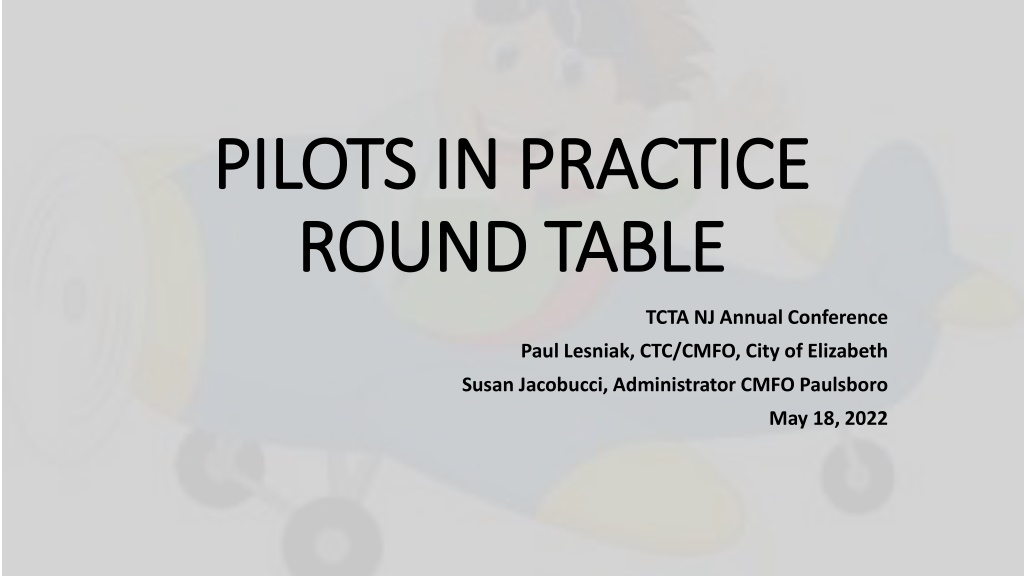



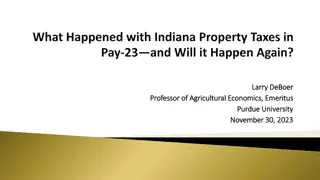
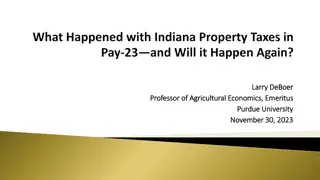



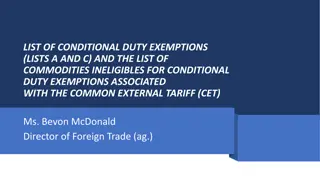
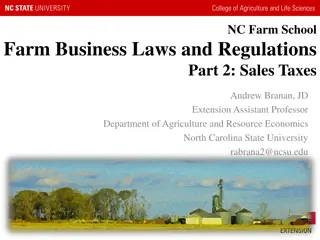
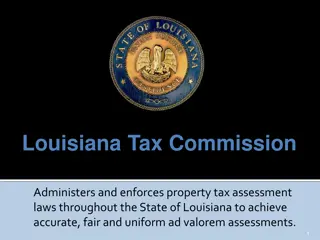

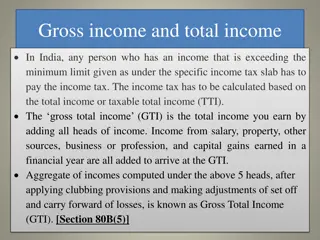
![Town of [Town Name] Real Estate Tax Rates and FY 2024 Budget Summary](/thumb/62211/town-of-town-name-real-estate-tax-rates-and-fy-2024-budget-summary.jpg)

